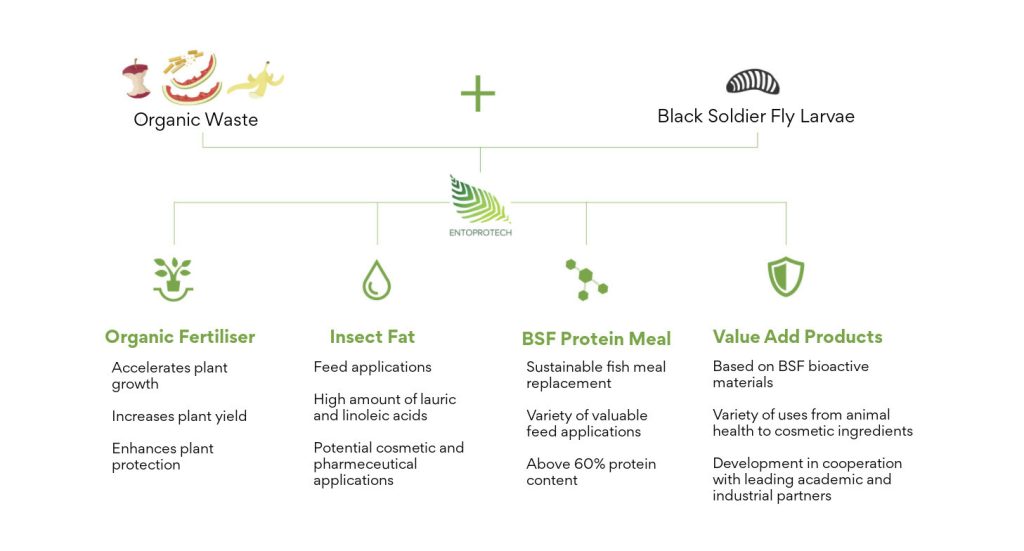This insect could eliminate food waste in cities. Here’s how

- COP26: Cities produce half of all global waste (including food waste).
- The black soldier fly (BSF) converts food waste into useful proteins and other high demand products, such as organic fertilizer that can be used in cities, parks and green spaces.
- Cities need a robust circular economy infrastructure to support the use of insects to convert organic and food waste.
Green advancements in food waste processing are opening new opportunities for cities to not only become more sustainable, but to play an important role in the creation of a local circular economy. The pandemic is adding to this momentum, as the emergence of Covid-19 has increased the volume of solid and household waste produced, which is leading cities to rethink how they approach waste disposal.
Circular solutions, such as the black soldier fly (BSF), are promising. This incredible insect converts food waste into useful proteins and other high demand products, such as organic fertilizer that can be used in cities, parks and green spaces.
Cities produce half of all global waste and are responsible for 60-80% of all greenhouse gas emissions, and so companies are harnessing the power of BSF to divert organic waste that would otherwise be dumped in a landfill or processed through less economically viable methods such as anaerobic digestion or incineration.
Using insects to process and recycle organic waste is a clean and circular solution, but progressing this option is challenging due to a lack of knowledge about circular economies coupled with regulations that encumber the implementation of sustainable waste processing.
Cities are sustainability superheroes
Cities have the opportunity to play a key role in advancing local, circular waste processes that go beyond strategy and programmes. Seoul is rich with inspiration – the city implemented a comprehensive initiative that has resulted in the city recycling 95% of its food waste, a massive leap forward when it used to only recycle 2%.
Truly sustainable cities can channel their influence into three key actions to create an environment where circular solutions thrive.
- Policies and data – Consistent, clearly stated policies around sustainability and food waste are the solid foundation of a local circular economy. The United Nations is encouraging cities to become “Waste Wise” by regarding waste as a resource, a fresh perspective that is best achieved by policies that progress circular economies. The UN recommendations emphasize data collection and analysis, such as a citywide food waste survey to assess the waste streams available using methodology developed by various waste producers. An approach that combines sustainable policies with data assessment not only serves as a precondition for green processors operation, but positions the city as a leader in the development of a circular food economy.
- Education and communication – Truly sustainable cities serve as a hub, connecting eco-friendly service providers with local producers of food waste, but education is sometimes the missing component of this connection. To recycle (ha!) the example above, by placing information gathered in the survey in the public domain, public servants both raise awareness of the challenge and potentially identify ways to reduce some of the waste streams at their source. By educating their local food waste producers about circular solutions, cities facilitate connections between their businesses and green processors. Additionally, education is the key to sustainable cities proactively embedding themselves into the circular economy as an essential source of information and leadership.
- Advocacy and regulation – As zero landfill policies become increasingly common, businesses are seeking environmentally and socially responsible ways to dispose of food waste. BSF are a very efficient and inexpensive solution, however, there are regulatory hurdles. Both organic waste disposal and animal feed are strictly regulated in most areas, with rules governing types of waste eligible for BSF processing and subsequent use of BSF as animal feed that limit the potential to develop a circular system. Cities and influential food waste producers can make a huge difference by actively supporting regulation that aligns with local municipal sustainability goals. For instance, New York City is implementing a pioneering regulation that requires businesses to sustainably recycle organic waste, as well as overhauling the existing waste management structure to encourage environmentally-friendly solutions.
Cities can also lead regional solutions by uniting several food waste producers from different sectors like industry, retail, and catering into clusters, served by large and efficient BSF waste-to-protein facilities.
By positioning themselves as an involved stakeholder, cities streamline the process for both waste generators and processors, while simultaneously resolving an environmental problem and generating tangible benefits for the city economy. Those benefits include mitigating landfill use by hundreds of tons per day, reducing the production of greenhouse gases and of course, supporting the local economy by creating jobs and connecting local businesses with green, cost-effective food waste processing.
There are also material benefits to circularity. For instance, sustainable cities that collaborate with BSF producers receive products, such as fertilizer provided to the city authority. Already, we have the potential to make a huge dent in the organic waste problem, and the solution is infinitely scalable.
City sustainability initiatives frequently focus on initiatives such as robust recycling programmes, carving out green space, and investing in public transportation. These are important and worthy endeavors, but as progress in the realm of food waste processing expands the discussion around circularity, cities have more opportunities to foster the development of a circular food economy – in other words, cities themselves can become an economic system that both eliminates food waste and continually re-uses resources.
weforum.org


